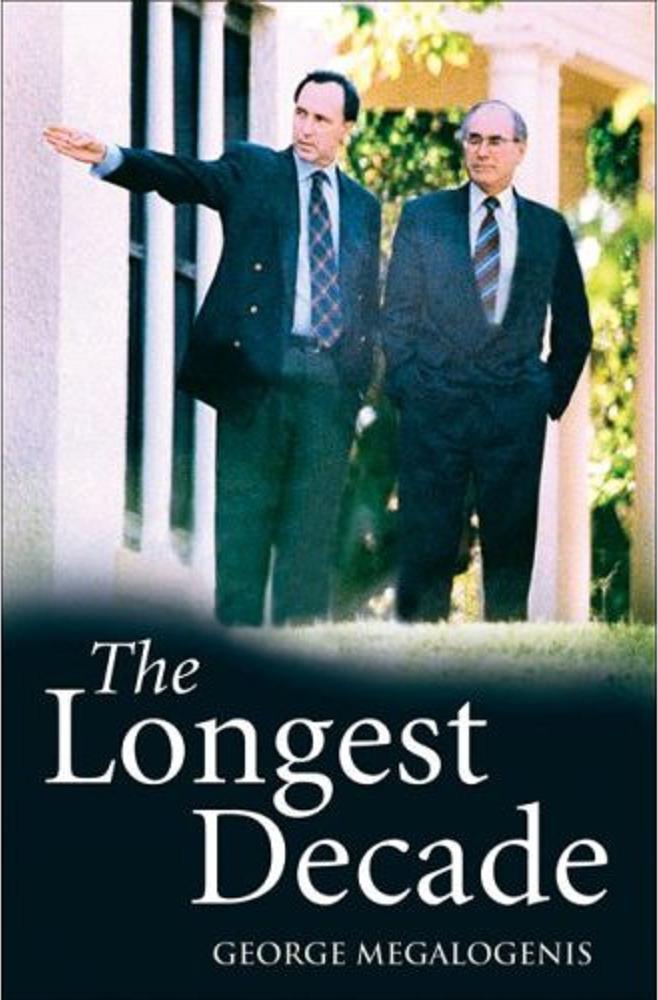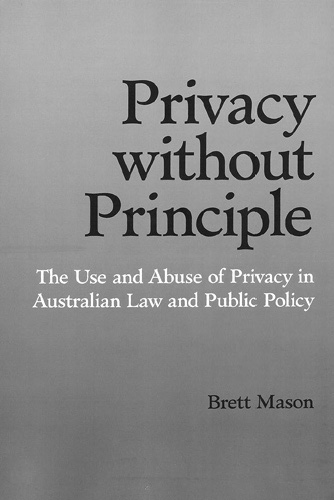The Longest Decade
by George Megalogenis
(Scribe, 2006, 352 pages)

This book is an engaging and refreshing analysis of two of the most influential Australian politicians in Australia's economic reform and modernisation. It is refreshing that, in the words of its author, "it plays the policies, not the man". Given that so much political analysis in this country plays on personality, many commentators have already expressed surprise that Paul Keating and John Howard could indeed have anything in common. One can only assume that the surprise is because so much of the media is biased by an ideology that it is largely incapable of saying much of an intelligent or objective nature, especially about the incumbent Prime Minister.
The central theme of the book is about how Paul Keating as Teasurer under the Hawke Government started the radical reform process of Australia's economy which Howard, as Prime Minister, continued to build on, giving this country over 15 years of continuous growth -- the longest decade. It gives a detailed account of this economic transformation and a colourful account of the political events that surrounded each step along the way. While bringing to light the similarities in these two men's respective economic credentials, it also fills out their very marked differences upon non-economic issues.
The book's blurb touts it as being "non-partisan" and although it gives both points of view throughout, with quotes in extenso from lengthy interviews conducted with both men, one gets the feeling that Megalogenis has a covert admiration for Keating, the smart-arse bully boy of parliament who got the whole reform process going, in contrast to his impression of a duplicitous, unfeeling Howard, with his overly harsh border-protection policies, and the present more selfish, divided Australia. In spite of this subtle yet discernible preference, Megalogenis does, nevertheless, manage to give a fair voice to both men, and this does give the book depth. Indeed, both protagonists have agreed to launch the book, albeit in separated cities and at different times.
Reading the two men in their own words certainly confirms or clarifies any views one may have of them. Keating, from his own mouth, appears as a swaggering, insufferably self-satisfied egomaniac, while Howard appears to be a modest, self-effacing gentleman who understands the mood of the electorate better than Keating ever did. Compare these two quotations:
I invented talkback radio for politicians. And I always talked up to the community. I think the great mistake of Howard is to always talk down to people: you know, let them eat cake, the Marie Antoinette view of the world. I tried to include them into the problem, to try and explain it to them.
I always felt comfortable and at home with [the Australian public]. I feel I understand them, and my respect for them has been very high and it grows. The Australian electorate is very bright. Hawke, as distinct from Keating, did respect the electorate. I think, on occasions, Keating didn't. It is a fatal mistake for a politician to think that he is brighter than the electorate.
It brings to mind that wonderful Nicholson cartoon on the day after the Howard victory in 1996. There we see Keating carting off an enormous, ostentatious, gilt-framed oil painting while Howard is quietly moving in with a small miniature tucked under his arm.
Some have challenged the book's lack of discussion about Hawke's contribution to economic deregulation. Megalogenis admits that he did not have the space to talk in detail about him -- he does give the impression that it was all Keating -- and concedes that Hawke, especially in the first couple of years after 1983, launched and set the ball in motion on reform. But after this start, it was essentially Keating who did the heavy pushing, while Hawke managed the politics of it.
And of course, importantly at the time, both Hawke and Keating had substantial support for the reform process from the opposition of the time.
Despite its relative lack of attention in the media, conservatives do remember and understand that the Hawke/ Keating reform agenda was very much aided by a co-operative bipartisan approach that made possible so much of what happened. Megalogenis recounts just how well these two men got on, and how Keating saw Howard very much as an ally in those early years. He tells the story of how, at one point, Keating invited Howard, then deputy opposition leader, into his office and handed him a copy of his white paper on tax reform, containing the so-called Option C for a consumption tax. He told him "Hang on to it for an hour, I haven't handed it to some of my colleagues yet". In Howard's words, we were "working together". It is to Howard's credit and Labor's shame that there is no longer the same bipartisan effort for reform.
Megalogenis is right to state boldly that "both men agreed on deregulation". He paints a concise picture of the complementary views of the two men. He reveals how Howard demonised, and Keating deplored, the old protectionist trade union culture. Keating now attacks present-day Labor for this very same thing, for going back to "the old anvil", a sort of protectionist, blue-collar instinct of the past.
Megalogenis puts it this way: "Keating had a very un-Labor love of private enterprise ... Howard has a very un-Liberal love of blue-collar Australians". He observes that both Keating and Howard were critical of Fraser and Whitlam -- the last of the Old Guard. Keating complains about the present direction of the Labor party: "It's walked away from financial innovation, from the opening up of the economy and the whole meritocracy model of widening its own appeal to single traders, to sole operators of business, small business".
Megalogenis seems to come unstuck when talking about social issues and the culture wars. He claims that "Paul Keating tried to change Australia: John Howard returned it to what it was". He claims that "Australia under Howard is demonstrably more unified than it had been under Keating", yet says that "the boom of the past 15 years has not secured social cohesion" and has "increased the distance between people". He further blames Howard's framing of public debate to single issues as inevitably diminishing "the public conversation", and that the rest of the time "we engage in the monologue of materialism". He starts to sound a tad like the culture wars harpy David Williamson, or the ABC, or the Fairfax press at this point.
While covering some fascinating detail and comments from both leaders on Hansonism, border protection, republicanism and reconciliation, his own policy positions come to the fore, and the analysis and conclusions are therefore less satisfying. On native title he states that "“Moral” is a big word, and I don't like using it because it denies the other side of the argument. But it applies here". Precisely.
Megalogenis accuses Howard of running the government "as a frequent-flyer program, with rewards based on loyalty, not need", but seems to forget the obsequious fawning of the arts industry under the largesse of the Sun King's prime-ministerial "Keatings".
Interestingly, the author downplays the issue of media culpability of "playing the policies, not the man" when challenged in public about its entrenched anti-Howard stance. He is after all one of them, but he does, to his credit, raise the issue:
On a good day, even if the number were bad, journalists would compete like schoolroom pets for the teacher's affection. The questions to Keating were soaked in jargon. The tone was often reverential, even conspiratorial. At the end of the 70 minute session, some of the most respected pontificators in the nation would float out of the room like teenyboppers heading for the exit sign after a rock concert. ... When the same group had finished grilling John Howard the heads would be shaking "that man will never be prime minister".
As David Barnett commented on the rise of Latham last year, and is quoted in The Longest Decade: "[Latham] was immediately embraced by the media as the next prime minister, as if nothing good had come from the Coalition government". The press's attitude towards star Labor candidates hasn't changed all that much.
This is an excellent history bursting with policy and personal detail. Megalogenis' political preferences are discernible, but it does not hinder the enjoyment of a brilliant exposé.


